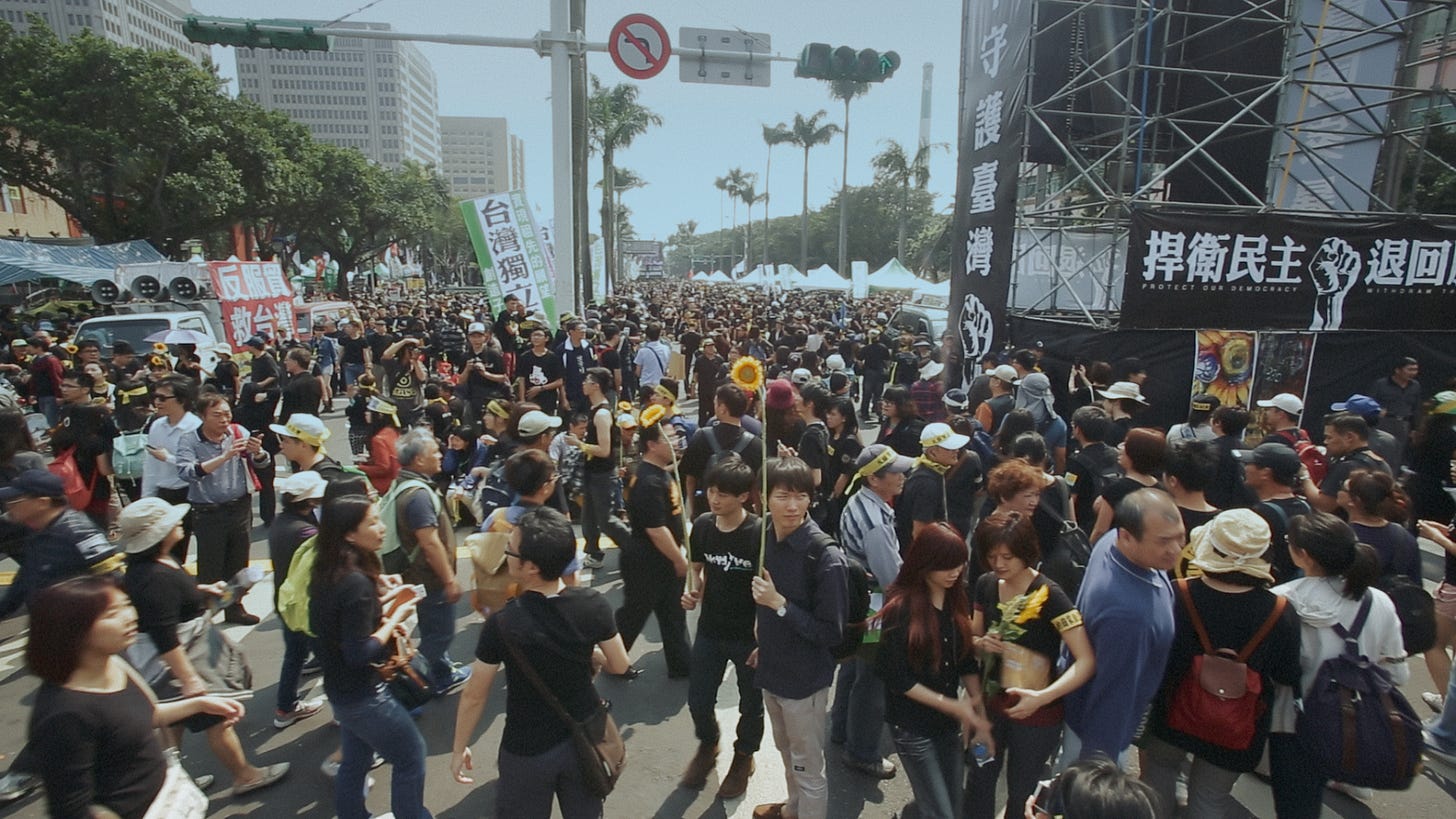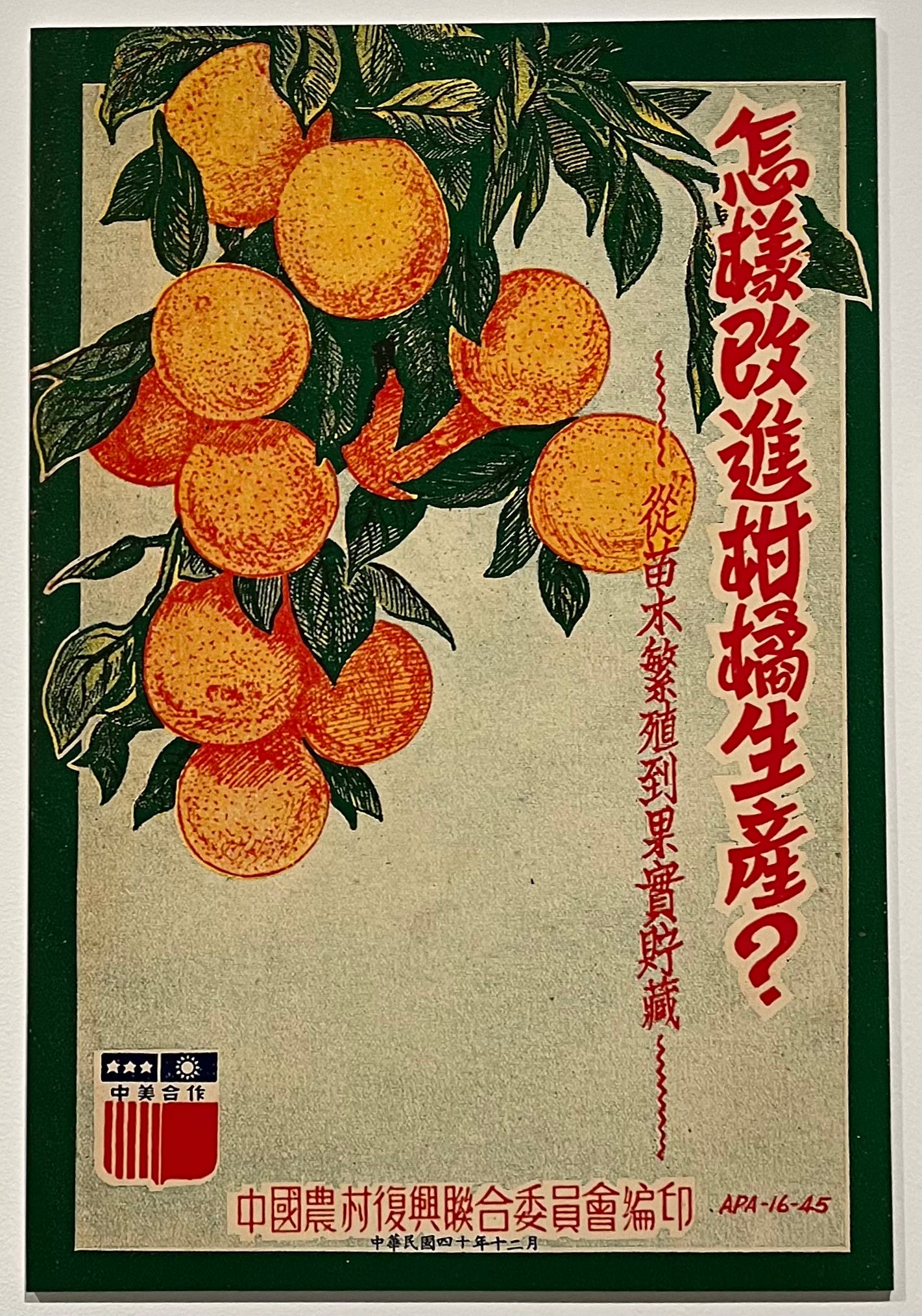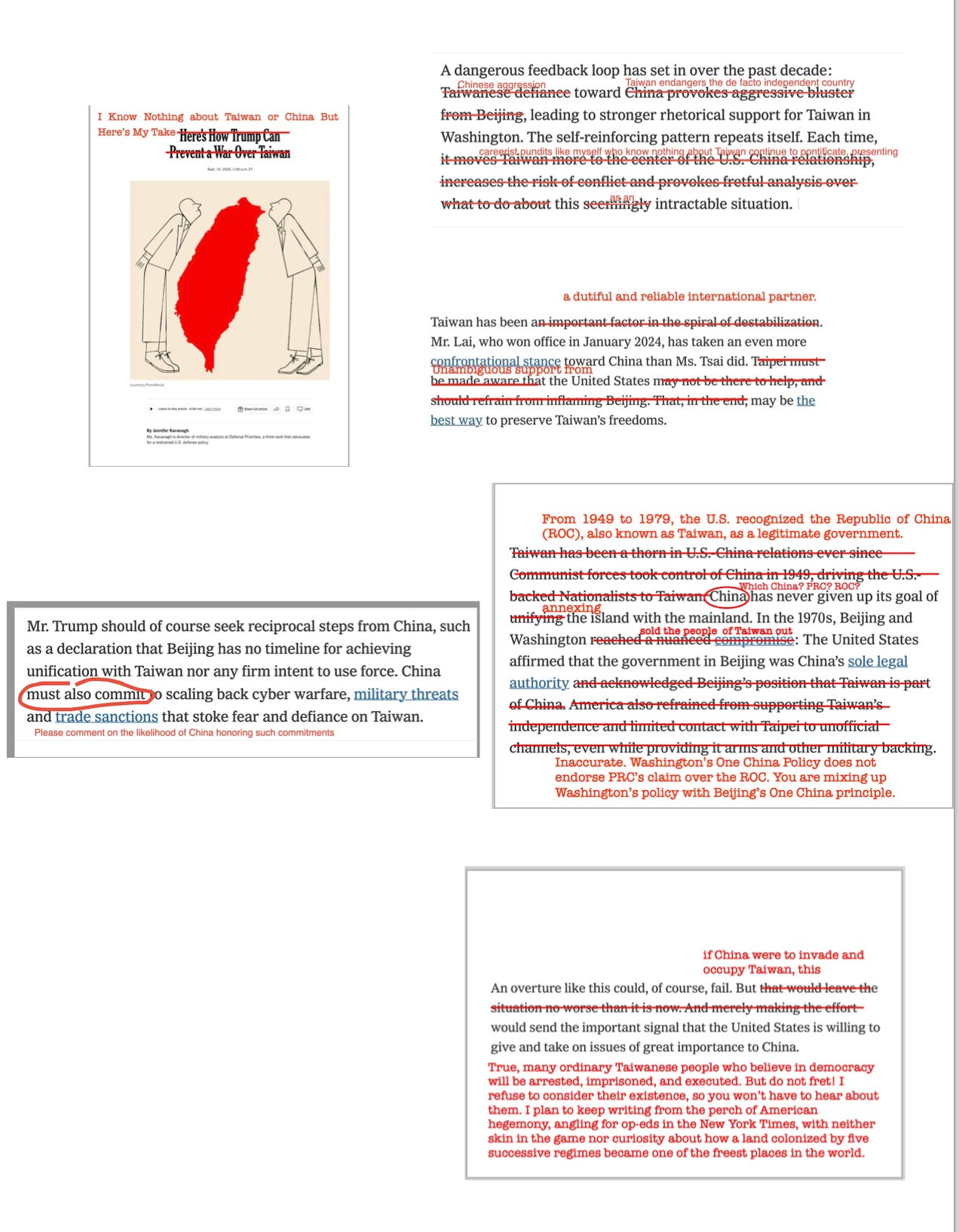A Sense of Dread: Isolationists under Trump Lay the Groundwork for Abandoning Taiwan, Marking a Radical Departure in Foreign Policy
Hello everyone,
Albert and Michelle here. We’re thinking of you all during another chaotic and depressing news cycle. But today we write with a genuine sense of dread about Taiwan—one we have not felt in the four years since moving here. Usually, when people ask if things are okay (by which they mean: will China invade and World War III begin), we shrug it off and say Taiwan is a wonderful place to live.
But as some of you know better than we do, the U.S. is off the rails.
To begin, Michelle wrote a semi-viral post criticizing a truly terrible New York Times op-ed—one that, if adopted, signals a new isolationist turn on Taiwan in Washington, a radical break in American foreign policy:
Our friend Kerim Friedman (read his wonderful newsletter!), an anthropologist who teaches at Donghwa University in Taiwan, summed up the op-ed:
Taiwan: [exists]
Beijing: Stop provoking me!
Useful idiots writing in the Times: Yeah, stop that.
Why the dread? There’s no question in our mind that Trump would sell out Taiwan if he could make a deal with China. He has no personal relationship to Taiwan, no affection for it whatsoever, and obviously would be unmoved or outright dissuaded by the aspects of Taiwan that move you and me. These are the stories we’ve been sharing in our newsletter—from Taiwan’s rich religious diversity, to dissidents once jailed for activism who later became mayors; from women leaders to the hard-won victory for same-sex marriage. We also feel dread because we know Trump has a pet grievance about Taiwan “stealing” America’s semiconductor industry (we write about this history in our recent review of A Chip Odyssey), and he famously nurtures his grudges, acting out vengefully.
This op-ed is particularly alarming because its writer, Jennifer Kavanagh, works for a thinktank, Defense Priorities, funded by the Koch brothers, which advocates withdrawal from Ukraine. Among the op-ed’s many flaws is its portrayal of Taiwan as an “important factor in the spiral of destabilization.” This is an infuriating accusation for myriad reasons.
First, we’d like clarification from Kavanagh: can you name specifically what the Lai administration has done to “destabiliz[e]” the status quo? For sure, Lai has made strong statements in his speeches, but none even come close to a change in the status quo. His most radical policy changes have been almost exclusively at a domestic level, such as restoring military trials for espionage cases, expelling people who have advocated for the violent annexation of Taiwan, and expanding defense against cybersecurity threats. This has undoubtedly affected the everyday lives of individual Taiwanese citizens. But how, may we ask, has that disrupted the realm of international relations? How has Lai ever crossed any red lines when it comes to the tight rope of Taiwanese independence?
Historian’s Sidenote, a.k.a. totally unnecessary finger-wagging but we’re going to do it anyway: the claim that “Taiwan has been a thorn in U.S.-China relations ever since Communist forces took control of China in 1949” makes no historical sense. From 1949 to 1979, there were no U.S.-China relations to speak of without Taiwan at its center. The U.S. recognized the Republic of China, with its seat in Taipei, as the China. Taiwan only became a “thorn” once Washington switched recognition to Beijing.
What the writer likely means—and this is a basic, if common, error—is that Taiwanese independence activists have always been a thorn in the side for the governments in Beijing, Washington, and Taipei. (This is why we joke that we should move to Tainan and make it the capital.) In the past, all three governments joined in an unholy alliance to marginalize voices for Taiwanese sovereignty. It’s therefore unsurprising that the CCP, KMT, and the Republican party now have sought to resurrect this unholy alliance.

The argument that Taiwan has been driving destabilization also contradicts itself: on the one hand, China’s power is so overwhelming that the U.S. must avoid risking war; on the other, little Taiwan, which is so insignificant it’s not worth defending, is somehow so powerful that it’s driving all the destabilization. Which is it?
Three years ago, we wrote about the analytical failure of blaming a small country in the realm of international relations. We’ve lifted this piece behind the paywall (bonus: it contains words from the OG Shawna Yang Ryan, author of Green Island) and quote from it here:
If the Americans and Chinese are headed towards war, is there anything in history that can teach us how to prevent it?
One of our favorite pieces on World War I is historian Paul Schroeder’s 1972 article “World War I as Galloping Gertie.” Schroeder asks the generations-old question of who was to blame for the war, replying to another historian, Joachim Remak, who argued that no one came out with their hands clean—neither the hotheaded Serbian nationalist who killed the heir to the Habsburg Empire nor the German Kaiser intent on playing power politics. On a deeper reading, though, it’s evident that Remak mostly blames the Serbians for upending the world with their nationalism.
But wait a minute, says Schroeder: that’s not how international relations work. Not every country is equally powerful, so not every country can be judged the same way. Small countries like Serbia have a very limited range of feasible military, diplomatic, and social responses to the global situation; big countries have far greater freedom to act.
Schroeder ultimately blames not Germany or Austria or Serbia, but the British Empire. Had the British been less ambiguous—had it backed up the tottering Habsburg Empire immediately after the assassination of Archduke Franz Ferdinand—it could have kept the other Great Powers in check and maintained peace. Instead, it equivocated, refusing to make its intentions clear.
In cleaving to strategic ambiguity and preserving its freedom of action, the British waited too long. Other actors filled the gap with their aggression. As the global hegemon, Britain had a “greater ability to change the outcome,” Schroeder charges, but it abdicated this responsibility. The Habsburg Empire was on the verge of collapse and the British Empire “assisted in her destruction.”
We all know what happened in the ensuing years: the “system was bent and twisted until it broke; its burdens were distributed not according to ability to bear them, but inability to resist.”
*
Why did this op-ed bother us so much? Elsewhere, Kavanagh has been more nuanced, calling for “strategic ambiguity,” the fragile framework that has underpinned an uneasy peace in the Taiwan Strait. But this op-ed amounts to a radical shift in American foreign policy toward Taiwan. Essentially, she’s urging U.S. to scale back its presence, leaving Taiwan to face China alone—and, incredibly, she blames Taiwan for this shift in American policy.
More, she doesn’t even consider that retreat could cause disaster; as Jeremy Page has warned in The Economist, “Signaling weakness on Taiwan, for instance, has as much potential to trigger Chinese military action as being over-provocative.”
We get it. From a U.S. realist or anti-imperialist perspective, the American empire is overextended. But if you want to argue for isolationism, then at least be upfront about the real structural reasons driving this need for change. The reality is that America is a declining imperial power, increasingly unreliable to its allies, and it faces a radically revisionist Beijing that aims to replace it as a hegemon in the Pacific.
But this is what bothers us so much: instead of making a good-faith case for isolationism, Kavanagh parrots PRC talking points that cast Taiwan as the aggressor. It’s the PRC line, hook, line, and sinker—accusing Taiwan of upending the status quo when it is obvious who the real aggressor is. Beijing launches an estimated 2.4 million cyberattacks on Taiwan’s government every day; has severed undersea communication cables in Taiwan’s waters; has tried to build paramilitary groups on the island; and has bribed legislators, interfered in elections, and unleashed sprawling disinformation campaigns aiming to polarize and divide the Taiwanese people. To call Taiwan the aggressor is insulting and flatly untrue. Taiwan has been a peaceful and dutiful partner to the United States. And it’s done nothing but try its best to comply with U.S. policy. Washington and Beijing—not Taiwan—drive the “spiral of destabilization,” with voices like hers leading the charge.
As other commentators have observed (here and here), most of the China hawks in Trump 1.0—including those with expertise on China who have expressed support for Taiwan—have resigned, been fired, or resassigned. (There was also some continuity between Trump 1.0 and Biden on China, with personnel continuing from one administration to the next; that has also ended.) American neoconservatives who once regarded Taiwan as a place worth protecting no longer have as much power; instead, people like Donald Trump Jr., who advocates “America First” and has said that foreign policy would entail negotiating with China and avoiding “poking the dragon in the eye unnecessarily.”
It’s this radical departure from established foreign policy that worries us. In the past few days, while dropping off our five-year-old at school or stopping by the supermarket, we’ve pictured a future where China invades and occupies Taiwan, with friends of ours getting arrested and executed. Yes, China has a law that gives the death penalty to what they call “diehard separatists,” and friends of ours are on the P.R.C.’s official list.
Still, this may be a clarifying moment for Taiwan and all of us who hope fervently that it will remain free. Taiwan is indeed a bulwark against China, but it is far more than that. At its core, Taiwan represents an ongoing decolonizing struggle, a vibrant site of human flourishing, a nation that deserves recognition in any emerging global order. If the future is multipolar, then that order must make space for smaller countries like Taiwan—states that have already made, and can continue to make, outsized contributions. A truly multipolar world cannot simply recycle the old imperial carve-ups of the nineteenth century; it must be something new.


An Isolationist America is Very Bad for Taiwan
Last fall, we wrote an essay on how an isolationist America would affect Taiwan. We’re lifting it out from behind the paywall today and reprint an edited excerpt that seems particularly relevant today:
What will an increasingly isolationist United States mean to Taiwan? Most distressingly, a U. S. retreat gives China much more space to maneuver. With Trump at the helm, PRC officials can pretty legitimately claim the mantle of being the “adults in the room.” We believe that the Xi Jinping regime is at heart expansionist and revanchist, and it has clearly made the annexation (whether “peaceful” or not) of Taiwan central to its vision of its world-historical place in the world. An American retreat from the region would give Xi the space to claim the mantle of being the “good guy” in international arena. You know what that means: pro-Taiwan activists are going to be depicted as pesky, de-stabilizing, troublemakers. (Flashback to the Chen Shui-bian years!)

American isolationism will fuel domestic actors in Taiwan who have for years depicted pro-Taiwan voices as destabilizing. Already we see the Blue (pro-KMT and often pro-China) media taking the tack that the ruling DPP bet on the wrong horse by putting all of its eggs in the U.S. basket, because it did not “de-escalate” risk with China. This is false information; it’s China that has refused to talk to the DPP government.
In short, it seems pretty clear that for those who believe in Taiwanese independence and sovereignty, we’re in for some rough waters. We’ve felt the tide shift the past six months, and we don’t see it switching back any time soon.
And you’re probably wondering about the million dollar question: Does this mean China is going to invade Taiwan in the next four years? Maybe not, as signs indicate that China faces enough internal problems and challenges to its domestic legitimacy that it would be disastrous for them to launch a war. But China can do a lot to Taiwan without launching a war. It can continue to expand its gray zone operations and test the boundaries of the status quo. It can cut off Taiwan’s ability to navigate the sphere of international relations. It can use economic and geopolitical coercion to punish pro-Taiwan voices and allies. It can ramp up disinformation and media infiltration campaigns into Taiwan to intensify the polarization within a polarized country. An American retreat will only embolden these attempts.
Are there any silver linings—anything that gives us hope? Well, the United States for decades has clung to a somewhat hypocritical policy, commonly referred to as “strategic ambiguity.” Basically, they claim to support Taiwanese democracy and regard Taiwan as a partner, but they don’t recognize Taiwan’s claims to sovereignty and full membership in the international community. The Trump moment is crudely clarifying to Taiwanese people: So yes, you always just wanted us for our chips, and oh you’ll still take our money for arms sales. We knew all along you would sell us out. The blinders are off now.
The upside of everything being transactional is that it takes two to tango. It gives people in Taiwan the opportunity to think about why we’re valuable, what it is that we can offer to the world.
Some Links
We highly recommend this conversation between Peter Slezkine and Sam Moyn if you want to hear more conversations about a multipolar world.
We’re recently experimenting more with Substack Notes, which has matured into an interesting platform. Albert’s been posting his favorite bike routes in Taipei— introduced to him by the wonderful Michael Fahey, a longtime Taiwan resident, lawyer, and translator. The route passes through the largest Muslim cemetery in Taipei, as well as a memorial to victims of killed by the White Terror. Read more about 魏文賢, executed for printing leftist pamphlets and materials at the age of 23. His story is a reminder of Taiwan’s authoritarian past and the struggles that created its democratic, multi-layered present.
Book Club
We loved talking to you all about Patricia Engel’s Veins of the Ocean! Our next book club is Friday, October 24th 7 PM EST / Saturday, October 25th 7 AM Taiwan time. We’re going to read Sally Rooney’s Intermezzo for the October book club. After, we’ll be reading Miranda July’s All Fours, Budi Darma’s People from Bloomington, Twain’s Huckleberry Finn, Percival Everett’s James, and Natalia Ginzburg’s Road to the City. The book club is open to all paying subscribers. Thanks to our book club members for their suggestions! Please reply to this email for a zoom link.




